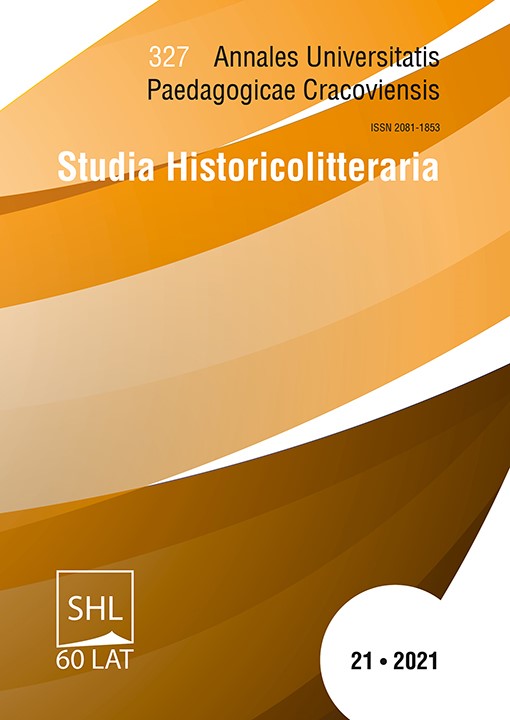O wierszach jak abanicos. Hiszpańskie tropy w poezji Alfreda Marka Wierzbickiego
Hauptsächlicher Artikelinhalt
Abstract
Poetry by Alfred Marek Wierzbicki emphasises conspicuous travel routes, so poems inspired by particular places are easily extractable. By analysing poetic images showing Spain and Latin American countries, the author discusses the nomadic nature of the works presented and reconstructs the poetic creed of the author of 'Stąd i stamtąd' [From here and there]. Tracing the intertextual relationships inscribed in the works, the researcher explains the symbolic code hidden in the landscapes and spaces of cities. As the author of the fictional figure called “Pan Credo” [Mr Credo], Wierzbicki is a poet focused on the axiological issues connected with the significance of human existence and the sense of one’s own permanence.
Downloads
Artikel-Details

Dieses Werk steht unter der Lizenz Creative Commons Namensnennung - Nicht-kommerziell - Keine Bearbeitungen 4.0 International.
URHEBERRECHTE
Der Herausgeber der „AnnalesUniversitatisPaedagogicaeCracoviensis. StudiaHistoricolitteraria” ist zur Nutzung und Verbreitung aller in der Zeitschriftveröffentlichten Materialien auf Grundlage eines nicht ausschließlichen, zeitlich unbeschränkten Lizenzvertrags befugt, der im Voraus unbefristet mit jedem/r Autor/in des jeweiligen Werks für die im betreffenden Vertrag vereinbarten Nutzungsbereiche abgeschlossen wird.
POLITIK DES OFFENEN ZUGRIFFS
Die „AnnalesUniversitatisPaedagogicaeCracoviensis. StudiaHistoricolitteraria” sind eine Fachzeitschrift mit freiem Zugriff, dessen voller Inhalt kostenlos für Nutzer und Einrichtungen auf Grundlage einer nicht ausschließlichenCreativeCommons-Lizenz (CC BY-NC-ND 4.0) verfügbar ist. Die Nutzer/innen können die Artikel in dieser Zeitschriftohne vorherige Zustimmung des Herausgebers oder des/r Autors/in lesen, herunterladen, Kopien anfertigen, verbreiten, drucken oder zu Volltexten verlinken, insofern die Quelle des Zugriffs und der/die Autor/inder jeweiligen Publikation angegeben wird. Dies ist mit der BOAI-Definition des offenen Zugriffs konform (http://www.soros.org/openaccess).
Literaturhinweise
Bernacki P., Przepisać obraz – kilka uwag na temat ekfrazy, http://lyzkamleka.poezja-art.eu/wp-content/uploads/2013/07/ekfraza-Przepisać-obraz.pdf (dostęp: 1.04.2021).
Dębowski J., O naturze świadomości. Samoświadomość – jej główne odmiany i funkcje, „Humanistyka i Przyrodoznawstwo” 2014, nr 20, s. 13–28.
Genette G., Palimpsesty. Literatura drugiego stopnia, przeł. A. Milecki, [w:] Współczesna teoria badań literackich za granicą. Antologia, red. H. Markiewicz, t. 4, cz. 2, Kraków 1992, s. 107–155.
Hadryś J., Asceza w doświadczeniu duchowym Teresy z Lisieux oraz Teresy z Los Andes, „Poznańskie Studia Teologiczne” 2010, s. 175–190.
Ingarden R., O niebezpieczeństwie „petitionis principii” w teorii poznania, [w:] U podstaw teorii poznania. Część pierwsza, Warszawa 1971, s. 357–380.
Kuźma E., „Palimpsestes. La littérature au second degré”, Gérard Genette [Paris 1982], „Pamiętnik Literacki” 1987, nr 2, s. 392–399.
Rybicka E., Geopoetyka. Przestrzeń i miejsce we współczesnych teoriach i praktykach literackich, Kraków 2014.
Symotiuk S., Przechadzka jako czynność filozoficzna, [w:] tegoż, Filozofia i genius loci, Warszawa 1997, s. 105–123.
Szczęsna E., Aforyzm i slogan – język jako zdarzenie fikcji, „Teksty Drugie” 2004, nr 1–2, s. 252–266.
Wierzbicki A.M., „…na ziemi w lublinie…”. Felietony społeczno-kulturalne, Lublin 2008.
Wierzbicki A.M., 76 wierszy, Lublin 2017.
Wierzbicki A.M., Autoportret z miastem. Wybór wierszy, Lublin 2013.
Wierzbicki A.M., Boso, Lublin 2015.
Wierzbicki A.M., Fotografia rodzinna, Lublin 2010.
Wierzbicki A.M., Głosy i glosy, Lublin 2008.
Wierzbicki A.M., Inaczej każdej wiosny, Lublin 1993.
Wierzbicki A.M., Kogut z Akwilei, Lublin 1999.
Wierzbicki A.M., Miejsca i twarze, Lublin 2003.
Wierzbicki A.M., Stąd i stamtąd, Kraków 2020.
Wierzbicki A.M., Znaki szczególne, Lublin 2000.
Zarębianka Z., Oblicza ciszy w poezji polskiej dwudziestego wieku na wybranych przykładach, „Tekstualia” 2009, nr 3, s. 167–174.
